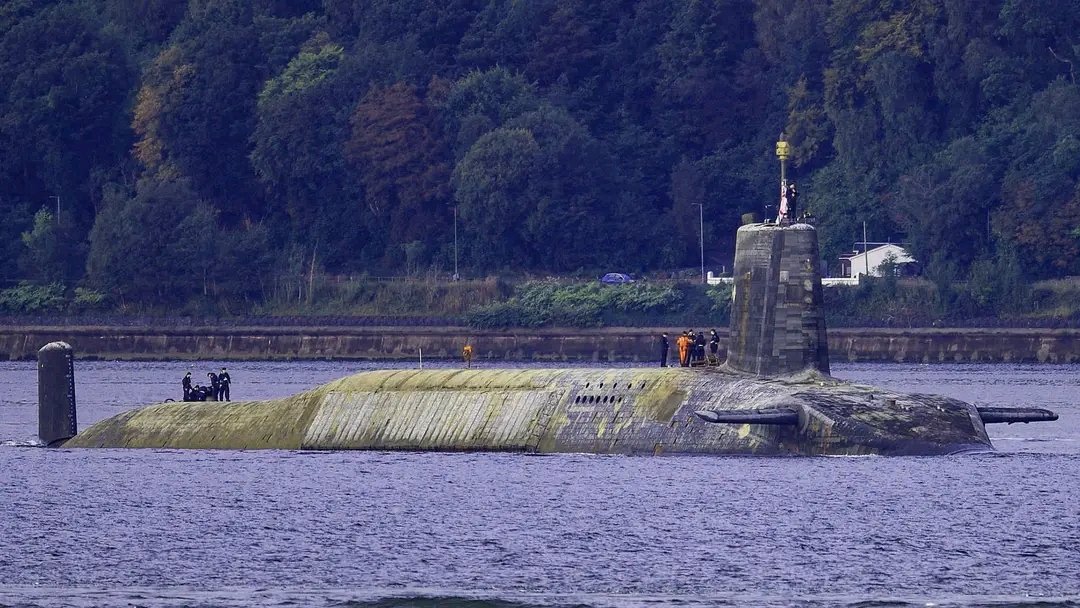The crew of a Royal Navy Vanguard-class nuclear submarine reportedly faced severe food shortages during an extended six-month patrol, prompting measures to conserve energy and limit calorie intake.
According to the Sun, medics on board the Vanguard-class vessel feared “a serious loss of life” due to exhaustion and potential lapses in concentration that could compromise operational safety.
The prolonged patrol, caused by the limited availability of working submarines, reportedly placed an unusual strain on the crew. The submarine, not named due to security protocols, was initially scheduled to be resupplied at sea. However, the anticipated logistical support did not materialize, leaving the crew to rely solely on the vessel’s limited stores.
The report added that as food stocks dwindled, the onboard “honesty shop,” where crew members could access snacks, was shut down to prevent hoarding.
Additionally, crew members were asked to relinquish personal supplies of sweets and chocolate, and those off-duty were encouraged to rest to conserve calories and avoid unnecessary energy expenditure.
A source described the situation as “miserable.” Medical staff raised concerns about a “serious loss of life due to fatigue,” the source added.
However, the Royal Navy has denied any allegations of food shortages or safety risks, maintaining that the submarine’s crew consistently received a “nutritionally balanced diet” throughout the mission. An official spokesperson affirmed, “Robust procedures ensure crew safety at all times on missions.”
2X Faster Than Anglo-French Concorde, China Claims Testing Mach 4 Supersonic Passenger Jet Prototype
This incident occurs as the Royal Navy’s submarine fleet faces increased strain due to a shortage of operational vessels.
The report follows an official apology from the head of the Royal Navy in response to an investigation uncovering reports of systemic “misogyny, bullying, and other unacceptable behaviors” within the submarine service.
At least one allegation of rape was documented, alongside other disturbing accounts of harassment and misconduct directed at female personnel.
The Royal Navy is addressing these reports as part of a broader effort to implement stricter oversight and uphold standards across its operations. This recent incident, however, raises questions about logistical preparedness and the welfare of service members during extended missions.
Underwater Fighters! BIG European Firms Battle For ‘Big Ticket’ Indian Navy’s AIP-Submarine Contract
The Strain On Britain’s Vanguard-Class Submarines
Britain operates a fleet of four Vanguard-class submarines, which play a crucial role in the country’s nuclear deterrent strategy. At any given time, one of these submarines is on patrol, and its precise location is kept confidential.
Ukraine War ‘Setbacks’ Pushing Russia Towards Nuclear Options; Pentagon Intel Warns Of Nuke War
Sailors aboard are permitted to receive a single 40-word message each week, which is filtered to exclude any negative news.
Due to a shortage of operational submarines, patrol duration has been extended to six months, significantly longer than the traditional 80-day deployments.
This shift has led to increasingly prolonged missions, with HMS Vigilant achieving a record-breaking 195-day patrol in September 2023 and at least one other submarine nearing a similar milestone in 2024.
Several factors have contributed to these extended deployments, including delays in the refurbishment of HMS Vanguard and the unavailability of the shiplift at HM Naval Base Clyde – commonly known throughout the Navy as Faslane – for essential maintenance tasks.

The Royal Navy’s official website said, “The nuclear reactors that power the Astute class never need to be refueled during their 25-year service period, while the ability to purify water and air means their range is only limited by the amount of food on board.”
Nuclear submarines possess the remarkable capability to generate their own power, desalinate seawater for freshwater, produce oxygen, and eliminate excess carbon dioxide, theoretically granting them nearly limitless endurance, contingent primarily on the reliability of their machinery. However, the real constraint lies in the psychological resilience of the crew and the availability of food supplies.
Hans Kristensen, Director of the Nuclear Information Project at the Federation of American Scientists, said, “Good reminder that although nuclear propulsion gives essentially limited range, the real constraint is the need of the crew.”
An important aspect of the situation is the revelation that plans to resupply submarines at sea were “scrapped for unknown reasons.”
Navy Lookout speculated that the expectation for maintaining a six-month deployment was contingent on receiving supplies mid-patrol. This would necessitate surfacing discreetly, possibly at night, to quickly take on food and offload waste, ideally in a sheltered location to minimize exposure and risk.
Such operations would require specialized equipment, as approaching a submarine in open water poses significant challenges. Alternatively, supplies could be delivered via helicopter, although either method risks violating a core principle of nuclear deterrence, which emphasizes remaining submerged to avoid detection.
- Contact the author at ashishmichel(at)gmail.com
- Follow EurAsian Times on Google News




